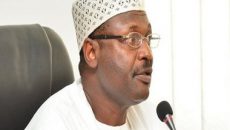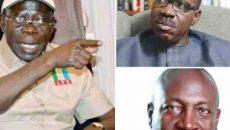INEC begins its six steps to the final conduct of the presidential and national assembly elections
Mahmood Yakubu, embattled chairman of the Independent Electoral Commission, INEC, Saturday, apologized for the inability of the electoral management body to conduct the presidential and national assembly elections on Saturday, February 16, as scheduled.
“As Chairman of INEC, and on behalf of the Commission, we take full responsibility for what happened and we regret any inconvenience our decision might have caused. We believe that ultimately, this is for the good of our democracy and country.”
He reaffirmed that the new dates of February 23 and 9 for the federal and state elections were sacrosanct. He outlined six steps the Commission would follow to complete the election process culminating in voting on Saturday, as follows:

1 Completion and confirmation of deployment of materials: Monday, February 18.
2. Configuration of Smart Card Readers: Sunday, February 17 – Thursday, February 21
3. Receipt and deployment of sensitive materials to local government areas: Wednesday February 20 and Thursday 21
4. Refresher training for ad-hoc staff: Thursday, February 21
5. Deployment of personnel to Registration Area Centres: Friday February 22.
6. Election: Saturday, February 23.
A very sober Yakubu explained the Commission’s dilemma to stakeholders at the International Conference Centre, Abuja: “Faced with these challenges, we initially thought that we only required a maximum of 24 hours to resolve the logistics issues involved and complete our deployment for the election. This would mean shifting the elections to commence on Sunday 17th February, 2019. However, given the restriction of movement during elections, that could affect many voters who worship on Sunday. While the commission considering the following Monday, 19th February, 2019 as an option, our ICT department advised us that it would require 5-6 days to configure about 180,000 smart card readers earlier programmed to work only on election day, Saturday, 16th February 2019.”
While some political parties saw reasons and empathized with INEC, some were bitter and condemned the Commission. The most vociferous was the ruling All Progressives Congress, APC, Adams Oshiomole, its chairman, took the Commission to task: “Why did you have to wait till 2.30am this morning to postpone the election? You kept reassuring Nigerians that you were ready!”
He insisted that Yakubu’s pleading that 176, 000 polling stations across the country are a “huge statistics to cope with|” was “begging the question…You have embarrassed us as a people. You must apologize to the country. We insist it was wrong to announce the postponement at 2.30 am”
He admonished some political parties which commended the Commission for doing a good job: “I am shocked! I am disappointed! What will you do if the election was successful?”
He agreed with stakeholders who suggested that INEC should have briefed political parties before announcing the postponement, arguing that “the society is not driven by law but by consultation.”
Still on the war path, the APC chairman threw a bait at the Peoples Democratic Party, PDP, which just sent a representative. “I am happy with the moderate tone of PDP,” he said sarcastically.
But the main opposition party ignored him. The Party was rather concerned about an INEC Card Readers contractor, Activate Technologies, who he alleged is an APC candidate in Niger State. He wanted reassurance that the card readers will not be rigged to favour APC, as being suspected in some selected states the APC consider crucial. The Party requested that there should be third party verification of the card readers when released by CBN to be sure they had not been tampered with.
Yakubu explained that Activate Technologies had been working with INEC since 2011 and assured that “no electoral assets with the Commission will be compromised. The integrity of the process is protected.”
He reaffirmed that uncollected Permanent voters cards cannot be used in the elections and wondered why people were allegedly buying up PVCs to gather voters’ information while the Commission had given each political complete information of the voters’ register. “Why buy what you already have? We assure the information cannot be used to rig the election.”
It was revealed that in Lagos State there was selective release of PVCs to favour APC as PVCs for areas considered not to be the party’s strongholds were withheld by the Commission’s representatives in Lagos. These areas include: FESTAC Town, Ojo, Alaba, and Lekki. “When they see your name, they tell you, ‘no pvc!’ reported Godson Okoye. Yakubu promised he would investigate it.
Parties were worried about the financial cost of the postponement and inquired if INEC could compensate them. Yakubu said only the national assembly can make a law empowering the Commission to fund political parties. On the cost implications on INEC, he assured that the Commission can cope without asking for extra budget: “We are not complaining.”
Follow Us on Social Media

 WhatsApp us
WhatsApp us